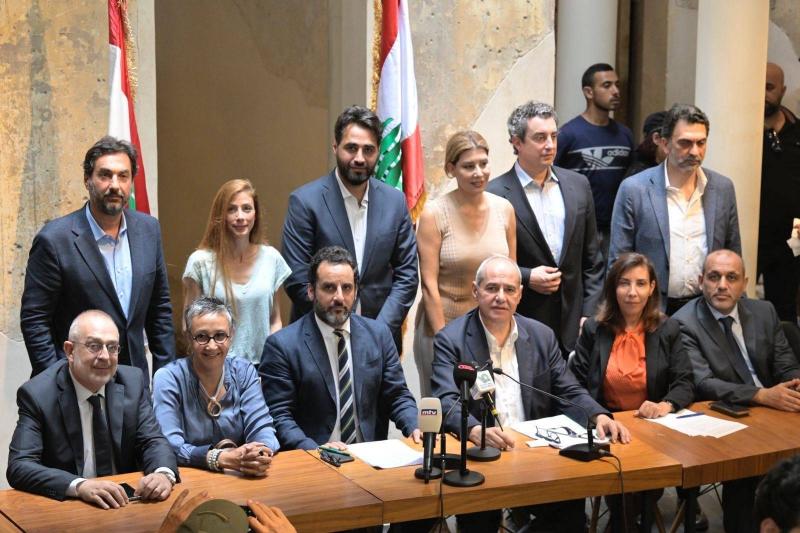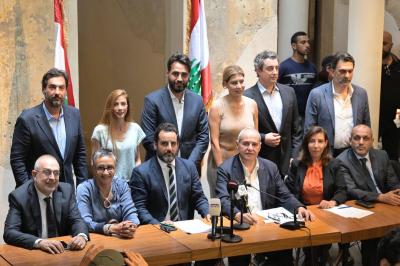The "Change Bloc" is expected to announce its death soon. The recent discussions about attempts to revive it are merely to convey that we did what we could. Holding onto the format of the 13 has become impractical, as everyone is now convinced of the mistake of treating the bloc as if it were a "Maronite marriage." The disputes have played a crucial role in the division, brought to the forefront by the stance on the invitation to dinner at the Swiss ambassador's residence in Beirut, with expectations that the 13 Bloc will branch out into two groups in the format of (9 - 4) or (8 - 4 - 1).
According to "Al-Akhbar," the dinner invitation at the Swiss embassy extended to MP Ibrahim Mneimneh was merely a catalyst for the members of the "Change Bloc" to air their disagreements publicly. The bloc learned about the dinner and Mneimneh’s attendance from the media, which triggered the irritation of most of his colleagues, most notably Waddah Sadaq, who believed no one represented him at the Swiss embassy meeting. Sources within the bloc assert that "after the conflict flared yesterday, Mneimneh clarified to several colleagues that the invitation was made to him personally and not on behalf of the bloc, and that he does not have much information about its background." However, this was not enough to calm the tensions.
Beyond the necessity of informing colleagues about the invitation and discussing it, the components of the bloc disagree on the appropriateness of discussing a reform of the political system and reaching a new social contract. Publicly, both Waddah Sadaq and Yassin Yassin affirmed their commitment to the "Taif Agreement," along with others who whisper such sentiments in private. This stance coincided with Saudi Ambassador Walid Bukhari's statement on the importance of the "Taif Agreement," as he hurried to Baabda and Ain al-Tineh yesterday to prevent any new foundational contract for the country.
Conversely, a faction within the bloc believes that "Lebanese should engage in discussions to agree anew on a system that aligns better with the country’s changes over the past thirty years." This group argues that "the current system obstructs political life, which requires internal and external settlements to revive its stagnant waters. The best place to contemplate options is the parliament, which represents various societal segments."
While all agreed that had they received the invitation, their position would depend on the proposed "agenda," and the nature of the meeting—whether it was a brief consultative meeting, a foundation for something greater, or limited to certain issues within sovereignty, and after informing the bloc.
Generally, Sadaq's acceptance of Bukhari's dinner and Mneimneh's boycott, along with Sadaq's opposition to the Swiss dinner and Mneimneh's inclination to attend, regardless of the opinion on their correctness, reflects the core differences that can be generalized among the bloc's components. They are products of a complex society whose segments do not resemble each other at all. They brought their complexities to the "October Uprising," where each street and square had its own slogans and political and economic projects that stood in stark contrast to the others, each with its red lines, particularly regarding relations with the outside world and the role of its ambassadors in political life.
With a settlement similar to those of traditional parties, they participated in the parliamentary elections with a minimum consensus among themselves. After winning 13 parliamentary seats, they decided to operate under a single bloc, continuing the process of misleading voters who believed they voted for a project represented on the list. This reality forced them to find a working mechanism to avoid continuous explosive pitfalls. Here, opinions divided again: one team proposes a voting mechanism to make decisions by majority, a numerically dominant team with 9 members (Waddah Sadaq, Mark Dweik, Najat Saliba, Elias Jarada, Paula Yacoubian, Michel Douaihy, Yassin Yassin, Rami Fanj and Melhem Khalaf), somewhat uniform in their political propositions. In the event of the anticipated divorce, according to accompanying sources, "this bloc or team may not include Michel Douaihy due to his differing economic perspective from the others."
In contrast, another team sees consensus as the best solution for decision-making, consisting of 4 members (Halima Qaqour, Ibrahim Mneimneh, Firas Hamdan, and Cynthia Zarazir). If Douaihy decides to detach from both teams, we would be faced with a structure of (8 - 4 - 1).
In conclusion, each team has its arguments. The supporters of voting contend that things cannot continue to be held hostage to the "veto" of the minority. Opponents of voting argue that "majority voting requires us to be a single party with a unified project." Therefore, the dissolution of the bloc could be the moment of truth that the MPs owe to their voters.




